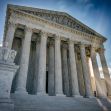A group of about 20 armed Federal Bureau of Investigation (FBI) agents dressed in tactical gear raided the home of Los Angeles-based actor Siaka Massaquoi in the early morning hours of June 10, 2021, to execute a federal search warrant. They believed that Massaquoi had entered the U.S. Capitol building on January 6 to protest the 2020 election results. After the FBI raid, Massaquoi sued for constitutional injury and property damage and asked that his confiscated belongings be returned. A district court dismissed his complaint in October 2021, and he appealed to the Ninth Circuit. The dismissal was affirmed.
Massaquoi, 35, who is also an anti-vaccine activist, the first vice-chair of the Los Angeles County Republican Central Committee, and a losing Republican candidate for the 43rd District of the California Assembly, told the Southern California Record in June 2022, “In a two-week span, we saw these mass shootings in Uvalde and Buffalo and the FBI knew each of those guys. Yet, you came into my home when I am sleeping with guns drawn and a little battalion and I have only one shotgun just to exercise my Second Amendment rights. Something’s wrong here in our country.”
The plaintiff-appellant appeared in the Netflix series Ratched, NCIS, and other police-related television dramas. He claimed that he never entered the Capitol on January 6 but just stood in the archway, and his rejected appeal asked for a chance to “show footage to the judge.” Newsweek, however, reported that he could be seen in the Capitol in social media video posts.
A unanimous three-judge panel of the Ninth Circuit, composed of Circuit Judges Morgan Christen and Jennifer Sung and Senior Judge A. Wallace Tashima, reviewed the dismissal order by Judge Stephen J. Wilson for the Central District of California for abuse of discretion and denial of reconsideration on August 23. The panel noted that it had to “construe Massaquoi’s pro se complaint liberally, mindful that it was properly dismissed only if it appears beyond doubt that (Massaquoi) can prove no set of facts in support of his claim which would entitle him to relief.”
In his claim for damages, Massaquoi relied on Bivens v. Six Unknown Named Agents of the Federal Bureau of Narcotics, 403 U.S. 388 (1971). The Ninth Circuit, however, distinguished the plaintiff-appellant’s Bivens claim, noting that the U.S. Supreme Court said that expanding the case’s ruling was a “disfavored judicial activity.” Bivens was a 1965 case in which six FBI agents forced their way into a home without a warrant. Justice William Brennan Jr.’s opinion reversed lower courts and gave Bivens a cause of action if he provided proof of his injuries.
The Ninth Circuit’s Bivens review thus looked at whether Massaquoi’s case presented a new context and was “meaningfully different from other Supreme Court cases with implied damages actions.” The opinion said, “In particular, a court may not fashion a Bivens remedy if Congress already has provided, or has authorized the Executive to provide an alternative remedial structure.”
In affirming the district court’s dismissal, the Ninth Circuit concluded that Massaquoi’s claim did involve a new category of defendants. Unlike in Bivens, the FBI agents who raided plaintiff-appellant’s home did have a search warrant. In addition, Congress has enacted an “alternative remedial structure for claims” like Massaquoi’s report about alleged FBI improprieties.
He can now report misconduct to the Department of Justice’s Office of the Inspector General (DOJ-OIG), which may “investigate the allegations or refer them for investigation by another department.” The opinion notes that this alternative remedy possibility has been used previously and is an “adequate alternative.”
The alternative, which is now part of 5 U.S. Code Section 413 (b)(2), gives the Inspector General in the Department of Justice (DOJ) the authority to “investigate allegations of criminal wrongdoing…by employee or refer allegations to the Office of Professional Responsibility.”
Thus, despite Massaquoi’s charges that his Second Amendment rights were violated and that something is “wrong here in our country,” his constitutional and property damage claims can have another day in court and a new chance to be considered in a different forum.






